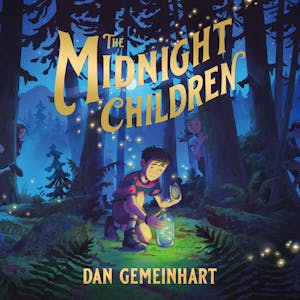CHAPTER ONEIn Which a Wish Is Not Spoken, and a Secret Is Kept
Nearly all of Slaughterville was sleeping when the children came.
There was no sign welcoming visitors to Slaughterville, because most of the town’s visitors were cows, and none of them were particularly happy to be there. They were even less happy when they left.
But, on this particular night, there were visitors. They arrived quietly, fingers crossed that they would not be noticed. And, for the most part, they weren’t.
The town was dark, except for the silver of the moonlight.
In the little block of buildings on Skinister Street that Slaughterville called downtown, the sheriff was in her office. But her feet were up on her desk, her head thrown back, eyes closed and mouth open, dreaming along to the opera music soaring from the record player spinning beside her.
Next door, Mr. Chin the baker was awake. He could have seen the children pass by, but he was bent over, sliding yet another great round sourdough loaf into the oven, and missed them, just.
All the other shops and stores stood dark and empty. The bell watched silently from the church tower at the end of the block as the children rolled through town on Skinister Street and out the other side.
The windowless slaughterhouse that gave the town its name was still; its machinery quiet, its blades idle but waiting, the killing floor hosed clean and empty. Moonlight glinted on the steely points of the dangling meat hooks. Cows dozed behind the fences in the muddy stock pens, not wondering even a little bit about what awaited them the next day. Which was probably for the best.
Just past the slaughterhouse, the truck clattered over the narrow bridge that crossed Carcass Creek.
It took the first left turn after crossing the bridge, its headlights flashing for a second on a tilting sign marking Offal Road.
There were only two houses on Offal Road before it dead-ended into the woods. Both of them were dark, and only one of them held living souls. The house on the left was empty, at least for the moment. And across the street, in the house on the right, on the second story, a boy lay in bed. All around his window, which looked out on the street, were birdhouses. Dozens of them, all shapes and sizes and colors. The boy had made them all.
That boy is the hero of this story. Or, rather, one of the heroes. No one would have been more surprised to hear that than the boy himself. He was about as far from a hero as anything he could imagine.
Sometimes, though, a soul doesn’t know how great it truly is. Until it has to find out.
The boy’s name was Ravani Foster.
Ravani’s mother and father were asleep. But he was not. He was staring at the ceiling. And he was crying.
He’d been woken, not by a sound or by a dream, but by a feeling. A feeling so strong that it jolted him out of sleep and into darkness. The feeling that woke Ravani Foster on this moonlit night? It was loneliness.
I don’t know if you’ve ever been so lonely that it woke you up. I hope not.
But isn’t it interesting that this particular boy was woken on this particular night by that particular feeling, when that exact truck was turning onto that exact road? It seems more than coincidence.
It seems almost like magic, perhaps.
This boy, woken by loneliness, heard something. A low, growly sort of rumble.
He wiped the tears off his cheeks, got out of bed, and crept on quiet feet over to the window that looked down on Offal Road. A large white truck was parked in front of the empty house across the street.
Ravani rubbed his eyes, not quite believing them. The truck made no sense. No one had lived in that house since old Mr. Croward had broken his hip and moved to Ironburgh weeks before. And no one drove into Slaughterville at night, because nothing happened in Slaughterville at night.
But, nevertheless, there it was.
The engine kept rumbling as a large and lumpy man stepped down out of the cab. A fat cigar glowed between his lips. He looked up and down the street, puffing smoke like a dragon.
Satisfied with the silence, the man walked around to the back of the truck, undid a latch, and with a rattling clatter rolled the door up and open. Then he stepped aside and leaned against the truck, eyes back on Skinister Street.
Upstairs, Ravani watched, waiting. And then, slowly, his mouth dropped open.
Because out of the truck stepped children.
One. Two, three. Four. Five, six. Six children. The oldest, a dark-haired boy whose head swiveled to scan the moonlit street around them, looked to be sixteen or seventeen years old. The youngest, a yawning girl in a white dress, was only five or six. The others, two girls and two boys, were somewhere in between.
Six children. Stepping down into moonlight without making a sound. Each carried a suitcase. The youngest girl held a ragged stuffed giraffe in one hand. But they had no furniture, no lamps, no mattresses, no chairs.
Six children, appearing out of nowhere. Alone, together.
No. Wait.
As Ravani watched, one more child emerged from the blackness of the truck. A girl about his own age, twelve or thirteen. She stood for a moment in the back of the truck, looking around at Offal Road.
Her hair, which was tied back with black ribbon, looked silver in the moonlight. But Ravani thought that in sunlight it would look gold. She wore blue jeans and a white T-shirt. One hand held a suitcase, just like the other children, but the other held something else: a white umbrella. The lacy, pretty kind that fancy ladies carried at fancy events like horse races and country picnics.
“A parasol,” Ravani whispered, thinking that was the right word, and it was.
The girl twirled the parasol over her shoulder. She looked left, and then she looked right, and then she looked up.
For a breath, Ravani was sure she was looking straight at him, standing shirtless in his window. He gasped and stepped back, though he knew that if she was looking at his window, he’d already been seen.
But then her gaze dropped, and the older boy reached up to take her hand, and she stepped down onto the street.
The man closed the back of the truck and climbed into the cab, and then the truck lurched into motion and grumbled away into the night, leaving the seven soundless children behind.
Copyright © 2022 by Dan Gemeinhart






